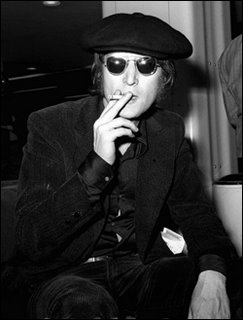Remembering John Lennon: A Great Songwriter and a Brave Political Activist Who Also Loved Cats
 |
| John Lennon |
"Doesn't have a point of view,
Knows not where he's going to,
Isn't he a bit like you and me?
Nowhere Man, please listen,
You don't know what you're missing,
Nowhere Man, the world is at your command."
-- John Lennon, "Nowhere Man."
He was a wild and reckless teddy boy from the rough and tumble side of Liverpool who grew into a visionary and a dreamer, a songwriter and a singer, a revolutionary and a peace activist and, ultimately, a martyr and a cultural icon. John Lennon was many things to many people, but to a generation that grew up during that magical moment in history known as the 'Sixties he was a hero. He was also brave. He was not afraid to take on the establishment either in the words to his songs or in his actions. Unfortunately, it was his accessibility and courage which in the end cost him his life.
It is difficult to believe that come this Thursday John will have been gone twenty-five years! More alarmingly, the world has changed so much from the time of the rollicking 'Sixties as to be nearly unrecognizable. Did his killer act alone or was he acting at the behest of the Federal government? It is difficult to say but his son, Sean, apparently still believes the latter in that he filed a lawsuit to that effect against the government back in the late 1990s. Whatever the story, John is dead and he will not be coming back. His death has left a gaping hole in the souls of the avant-garde that will never be filled. A quarter of a century later, the pain occasioned by his premature death not only refuses to go away but in fact intensifies with each passing year.
A crowd will gather this Thursday evening on Manhattan's Upper West Side at Strawberry Fields to commemorate his passing. Participants will light candles and observe a moment of silence shortly before 11 p.m., the time at which he died. A chorus or two of "Give Peace a Chance" or perhaps "Imagine" will punctuate the stillness of a cold December night. Across the street at the Dakota, Yoko will light a candle in the window. The graybeards in attendance will reminisce about what was and what could have been and wonder aloud how things could have gone so terribly wrong in the world. Whatever happened to all the dreams and ideals of the "Flower Generation?" Those born too late to have been a part of the 1960s will come to see what the fuss is all about but they will never be able to fathom what John and his music meant to the children of the 'Sixties.
In the aftermath of nine-one-one, Clear Channel banned Lennon's music from the airwaves of its more than 1600 radio stations. Paul McCartney's noncontroversial love songs and ballads can still be heard on stations which play oldies and classic rock but John's music only rarely receives airplay anymore. The right-wing has prevailed in cultural matters as well as in politics and economics and the last thing that they want the younger generations to hear are such Lennon standards as "Imagine," "Give Peace a Chance," "Happy Christmas," "Working Class Hero," "All You Need is Love," and "Revolution." The silver anniversary of John's passing is not going completely unnoticed by the capitalist media, however, mainly because of the recent publication of a slew of tell-all books about the rocker. In almost clownish fashion the capitalists seem to be forever torn between their desire to crush all dissent and their never ending lust for profits.
Despite the efforts of Clear Channel and others in the capitalist media, John's music continues to sell well. In addition to the aforementioned classics, Lennon compositions such as "She Loves You," "It's Only Love," "Daytripper," "Lucy in the Sky with Diamonds," "Strawberry Fields Forever," "Nowhere Man," "A Day in the Life," "Ticket to Ride," "I Am the Walrus," "Help," "Norwegian Wood," "It Won't Be Long," "A Hard Day's Night," "Please Please Me," "Real Love," "Free as a Bird," "Watching the Wheels," and "Number Nine Dream," still remain popular. The body of his work has aged well and his message of love and peace is still as pertinent today as it was forty years ago.
 |
| John Lennon |
In addition to his stupendous accomplishments as a songwriter and political activist, it is a little known fact that John was an avid cat-lover who reportedly at one time kept as many as six cats. In his book, The Last Days of John Lennon, his gofer, Fred Seaman, tells of purchasing cat litter and calf's liver at six dollars a pound for John's cats at the Dakota. It is not known what happened to his felines after he was killed or if Yoko even likes cats. Furthermore, Paul McCartney told Associated Press Entertainment Editor David Bauder in a dispatch published November 19th that at the time of Lennon's death he was having long telephone conversations with John about his cats and baking bread. Clearly, feline companionship was a big part of John's life.
By being an avid cat-lover, John was following in the footsteps of such prominent religious figures as the prophet Mohammad and the current pope, Benedict XVI. Successful politicians such as Abraham Lincoln and Teddy Roosevelt also loved cats. As far as the litterati are concerned, the list of ailurophiles is almost endless but Charles Dickens, Mark Twain, Ernest Hemingway, Victor Hugo, Emile Zola, Edgar Allen Poe, Cleveland Amory, and Samuel Johnston stand out.
Although John is gone, his music and his life continue to serve as an inspiration and a source of hope to the many fans he left behind.
Photos: Bob Gruen and Deutsche Presse-Agentur.

<< Home